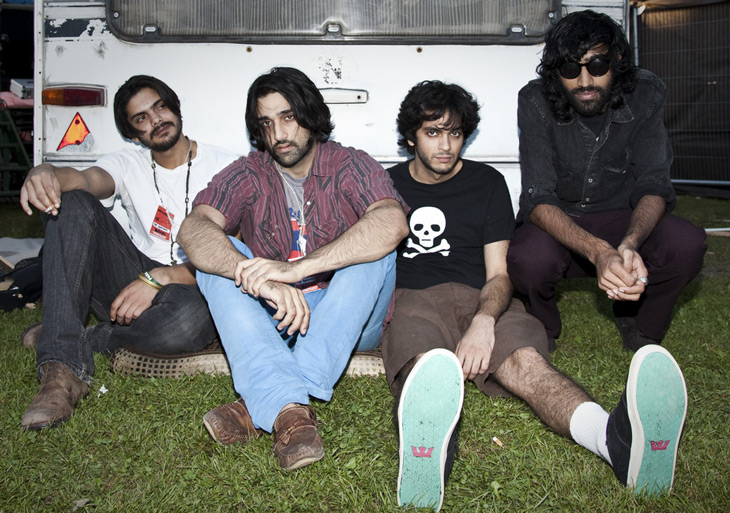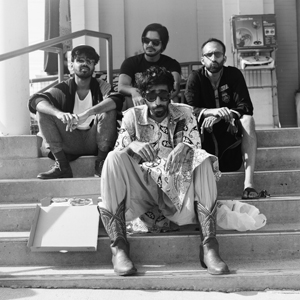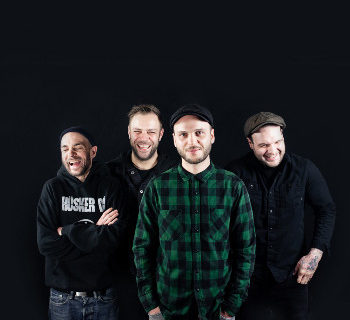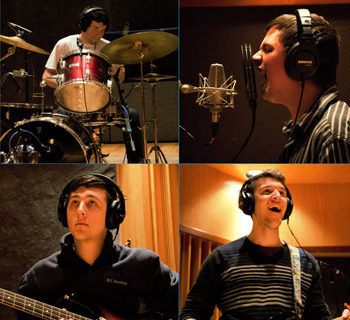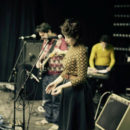“I am an Islamist, I am the antichrist!”—you won’t find many bands exclaiming such provocative lyrical territory, but that’s exactly why you should be listening to the Kominas (Urdu for “scoundrel”). Comprised of four Americans of South Asian descent from Boston, the band has described itself as “post-colonial punk,” with multicultural influences, political savvy, and a sound that reaches back whilst thrusting forward, to challenge assumptions and educate the masses.
Vocalist and bassist Basim Usmani and guitarist Shahjehan Khan first crossed paths at the Wayland Mosque in Boston, then, again at the University of Massachusetts, Lowell. Connecting with guitarist Sunny Ali (known from his previous bands PoPo and Sunny Ali and The Kid) and drummer Karna Ray, the band released its first album Wild Nights at Guantanamo Bay in 2008.
Considering the subject matter, it’s no surprise they’ve had to contend with a fair amount of controversy. “No matter what we do, it’s always like there is more scrutiny on us,” said Usmani, in a 2014 interview for Vanyaland. In a 2009 piece for the LA Times, Khan admitted, “We're not unaware of the fact that, because of the shock value of what we're trying to say, it's easy to get press coverage.”
However, the Kominas would never have lasted this long in the music business or gained the exposure they have if they weren’t possessed of the musical muscle to back up their lyrical power. Witness the progression of “Sharia Law in the USA,” where the swampy-sounding intro of wailing pipes and polyrhythmic drums melts into fuzzed up guitar feedback and heavy-metal drums before segueing effortlessly into a rolling, start-stop, finger-snapping wave of Clash-like intensity and wit. “Most squares can’t make most wanted lists/ but my, my, how I stay in style.”
There’s a good argument to be made that, in a post 9-11 world, the Kominas, are a necessary and organic entity, giving voice to thousands of young American Muslims and other minority groups struggling to find their own place in a Western society. “We have the privilege to express things for other people,” Kahn noted in the Vanyaland interview.
We have the privilege to express things for other people
“Having [had] the opportunity to play in Berlin, Paris, Oslo, and London,” said Usmani, in a 2015 interview for MTV, “I can see why politically minded punk rock still has sway in the various diaspora Muslim communities. When the far right is trying to criminalize your very being, it’s nice to have a scene that’s all about being yourself.” “As an American citizen with two academic Indian parents,” adds Karna Ray,” raised Hindu but with no particular religious affiliations, I am still systematically double-checked at airports.”
As seems apt for the band, they have an eclectic series of forthcoming gigs. By the time you read this, they will have finished their engagement at Rock Against Racism, back where it all started at UMASS, Lowell, and be gearing up for Boston’s Hindie Rock Fest in mid-October. Intriguingly, the band will then travel to Norway to headline the prestigious Bergen International Music Festival, which will see them line up alongside the likes of renowned concert pianists Lang Lang and Richard Goode.
In November, the Kominas have tentative plans to start work on a follow-up to 2015’s Stereotype. What can we expect from the self-styled “weird brown dudes?” With the current political landscape, they have plenty of material to mine, although they are far from a one-trick pony, with songs veering from the serious to the surreal to the comical. It’s hard to imagine, though, that a certain upcoming election won’t have a bearing, at least in part, on any new material. “I definitely don’t feel part of any scene,” noted Sunny Ali, in a 2015 interview for ColorLines, “except the one we have built.”

